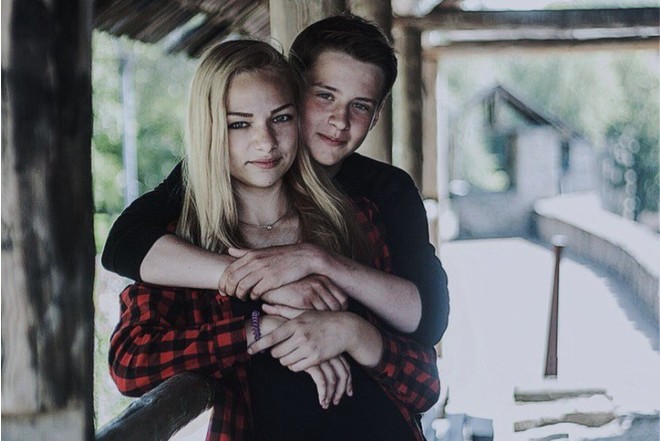Two fifteen-year-olds, a boy and a girl, fledfrom home. When her mother and grandmother came for Katya, and the police (Denis, who was listed as missing) came to the police, the young lovers barricaded themselves in the house and started shooting. In the police, in the neighboring houses. One of the bullets hit Kati’s mother’s leg. In parallel, they were broadcasting what is happening in social networks. They praised - they say, you will not get anything for it. But to us! .. We were sure that they would be imprisoned. Separated forever. People in the form went on the assault. The teenagers were found dead - according to the official version, the guy shot his beloved, and then shot himself. A photo: social networks “I loved you, but you yourself did not notice how you destroyed my psyche and life. Forgive everyone: friends, family, and acquaintances. Do not worry, I will leave beautifully. Good luck to everyone in your life and please do not be afraid to live as you want or see fit. A life of pleasure is the best life. I love you. ”This post is a suicide note that Denis and Kate left on their social networks pages. Same words. Same thoughts. Why? Why did the two young people, who had their whole lives ahead, prefer to cut them off? The answer is usually sought in the family. But both have normal families. Parents are not marginalized. Denis and his parents were quite even. Katya, however, is more difficult - her mother married a second time, her stepfather is a stern military man. They say that my mother was very strict with her, even beating her daughter. But which of us, say, sometimes were not awarded with a smack or even a belt? .. - Children who are not engaged are prone to suicide. I mean, do not do enough. Dressed, shod, fed - that's all. And there is no normal, lively and warm human communication in such families. This is already a dysfunctional family. This is the problem, says forensic psychiatrist Mikhail Vinogradov. According to the expert, the child, to whom parents pay enough attention, will not even have thoughts of suicide. Another nuance is the age of lovers. We used to think that 15 years old are still children. And the law says so. But, first, sexual and psychological maturity goes differently. Secondly, 15 years old are no longer such children. Remember, Pushkin’s marriage: “I was younger, my light. And I was 13 years old. 13 years is the historical age of the family. Parents forbade adolescents to communicate in the manner in which they would like. And everything that occurs on the way of lovers, at this age, causes a protest, - Mikhail Viktorovich continues. This couple has chosen its path. “Besides, look - the young man opened the safe with a weapon. But the safe - a reliable thing, the child is not under force. What kind of boy is he? In terms of development, he is already an adult male. And if there is a weapon, it should fire. Here and the police turned up in time, - explains the expert. And when the police went on the assault, the children subconsciously had a thought - they were finished. It means that there is only one way out: it is worthy, in their opinion, to pass away from life. What they did.
A photo: social networks “I loved you, but you yourself did not notice how you destroyed my psyche and life. Forgive everyone: friends, family, and acquaintances. Do not worry, I will leave beautifully. Good luck to everyone in your life and please do not be afraid to live as you want or see fit. A life of pleasure is the best life. I love you. ”This post is a suicide note that Denis and Kate left on their social networks pages. Same words. Same thoughts. Why? Why did the two young people, who had their whole lives ahead, prefer to cut them off? The answer is usually sought in the family. But both have normal families. Parents are not marginalized. Denis and his parents were quite even. Katya, however, is more difficult - her mother married a second time, her stepfather is a stern military man. They say that my mother was very strict with her, even beating her daughter. But which of us, say, sometimes were not awarded with a smack or even a belt? .. - Children who are not engaged are prone to suicide. I mean, do not do enough. Dressed, shod, fed - that's all. And there is no normal, lively and warm human communication in such families. This is already a dysfunctional family. This is the problem, says forensic psychiatrist Mikhail Vinogradov. According to the expert, the child, to whom parents pay enough attention, will not even have thoughts of suicide. Another nuance is the age of lovers. We used to think that 15 years old are still children. And the law says so. But, first, sexual and psychological maturity goes differently. Secondly, 15 years old are no longer such children. Remember, Pushkin’s marriage: “I was younger, my light. And I was 13 years old. 13 years is the historical age of the family. Parents forbade adolescents to communicate in the manner in which they would like. And everything that occurs on the way of lovers, at this age, causes a protest, - Mikhail Viktorovich continues. This couple has chosen its path. “Besides, look - the young man opened the safe with a weapon. But the safe - a reliable thing, the child is not under force. What kind of boy is he? In terms of development, he is already an adult male. And if there is a weapon, it should fire. Here and the police turned up in time, - explains the expert. And when the police went on the assault, the children subconsciously had a thought - they were finished. It means that there is only one way out: it is worthy, in their opinion, to pass away from life. What they did. A photo: social networks - In adolescents is not at all such an attitude to death, as in adults. They romanticize it, consider it something unreal, ”says Mikhail Vinogradov. Remember this childish“ I am about to die, let's see how you will cry ”? Here is the same perception of death. This “frivolous” attitude can be influenced. But here we return to the first problem: you need to talk with the children. They should be cared for, aware that they are needed and important. And one more thing. Social networks. Their influence should not be underestimated. - In transitional age, children are very susceptible to external influence. The Internet is useful, but it can be very dangerous. In social networks there is a certain direction that attracts young people with an unstable psyche. They talk about suicide, as a feat. And this is also a big problem, the doctor is sure. Indescribably sorry for Denis and Katya. Outwardly, well-off children instantly found themselves in their personal hell. From one glance at their VKontakte pages, I want to cry out loud - this is the embodiment of sadness and awareness of one’s own uselessness. Now in hell - their loved ones. Take care of children. They are the most important thing we have. And they should know this - not just know, but understand with every line of a tender childish soul.
A photo: social networks - In adolescents is not at all such an attitude to death, as in adults. They romanticize it, consider it something unreal, ”says Mikhail Vinogradov. Remember this childish“ I am about to die, let's see how you will cry ”? Here is the same perception of death. This “frivolous” attitude can be influenced. But here we return to the first problem: you need to talk with the children. They should be cared for, aware that they are needed and important. And one more thing. Social networks. Their influence should not be underestimated. - In transitional age, children are very susceptible to external influence. The Internet is useful, but it can be very dangerous. In social networks there is a certain direction that attracts young people with an unstable psyche. They talk about suicide, as a feat. And this is also a big problem, the doctor is sure. Indescribably sorry for Denis and Katya. Outwardly, well-off children instantly found themselves in their personal hell. From one glance at their VKontakte pages, I want to cry out loud - this is the embodiment of sadness and awareness of one’s own uselessness. Now in hell - their loved ones. Take care of children. They are the most important thing we have. And they should know this - not just know, but understand with every line of a tender childish soul.
6 ways to reach a teen without injuring him
How to raise a child while maintaining a connection with him,practicing psychotherapist Tatyana Ogneva-Salvoni told us. 1. Don't shift your powerlessness onto your childA child of this age needs to have everything explained to him. Usually, the concepts of what is good and what is bad are laid before the age of 10. But if parents were unable to set boundaries at the time, then in their children's adolescence they are faced with the first fruits of their upbringing. And here it is important that the parent does not shift responsibility onto the child. When they shout and hit, this happens from powerlessness, from the unwillingness to understand their own guilt. 2. Talk about your feelingsShow that you are not a robot, not an ideal, not an unattainable someone, but also a living person. And this means that other people are also alive, with their own feelings. By talking about their feelings, the parent shows strength and wisdom. 3. Learn to hear your child's feelingsAnd here you need to become a bit of a psychotherapist for him. Ask leading questions, do not condemn, do not edify, do not educate. And with the help of simple leading questions, “What happened? What do you feel? Why do you need this? What is behind this? What is the benefit/advantage/meaning of this? What would you call it, what is good about it? What does it give you?” and so on, you can get to the bottom of why the child is taking some extreme measure, what he wants to achieve by violating the laws of society. The main thing in this case is to withstand his negative feelings and complaints. Full version of the text on advice on









